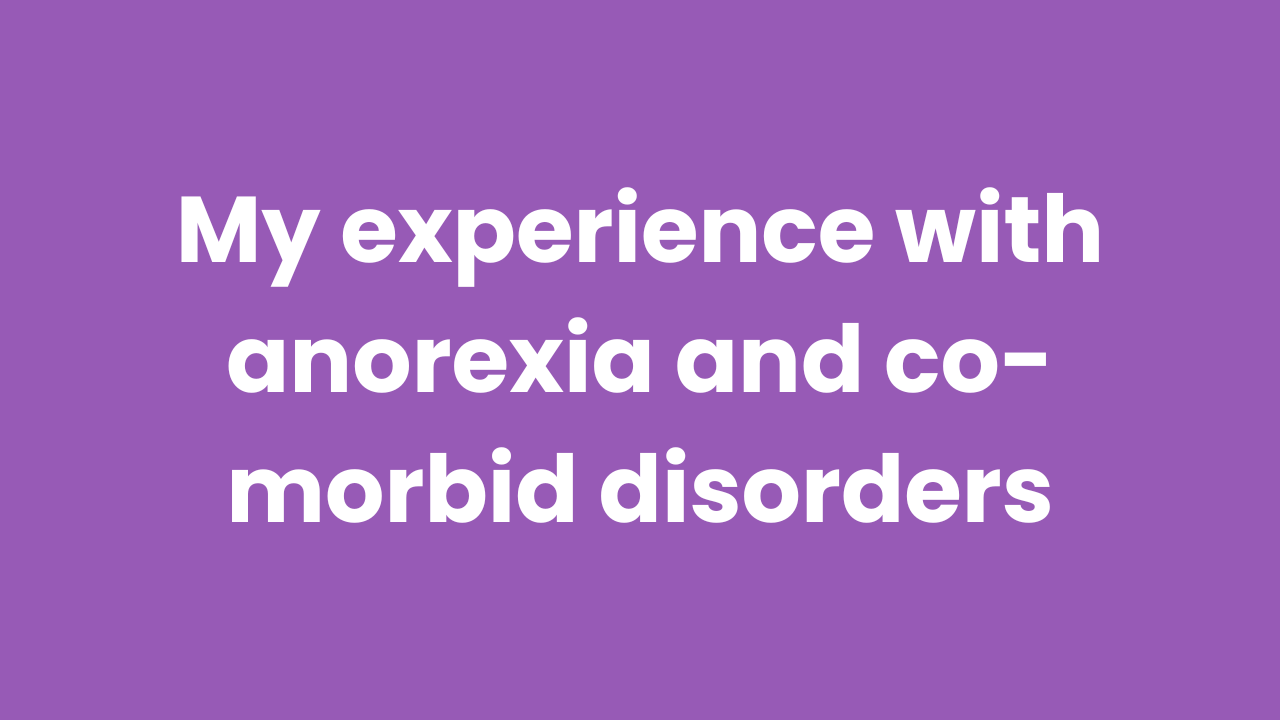My experience with anorexia and co-morbid disorders
Oct 18, 2020
I used to plug my ears to the word anorexia. When I was first diagnosed at the age of 11, I was furious. For years, I banned anyone from saying the word. “But I don’t see myself as fat…how could I possibly have anorexia?” I felt distanced from the diagnosis because I believed that “anorexia” meant a skeletal person that looks in the mirror and still sees a fat version of themselves staring back. No wonder, because in most biology books this is the graphic that is supposed to portray the illness. Even worse, this is the graphic that’s often used to portray eating disorders in general.
This belief that you have to struggle with body dysmorphia, or that eating disorders are caused by this drive to be thin, is one of the biggest misconceptions there is. When I was at my lowest weight, I knew how skeletal I looked. I purposely didn’t go out because of the disgusted looks and the nasty stares. I could read the judgement in their minds. The words that I heard ever so often, the words “just eat”...echoed in my mind each day anew. Of course, I knew this was the solution. Eating, resting, and gaining weight was the solution to the looks and the stares and the judgement. But the false control that anorexia gave me, overruled any possibility to choose food over restriction, or rest over exercise. For over 5 years, this feeling of control CONTROLLED ME.
My anorexia was a manifestation of my OCD and autism that I can trace back to my youngest years. I would neatly line up the shoes, make my bed, only draw symmetrical castles and rainbows…when I was in fifth grade, this obsession for perfection and order made its way into food and exercise. The weight loss was simply a side effect of my rigid behaviors and desire for routine. The becoming smaller was a manifestation of something that felt much bigger than myself. It wasn’t the end goal, although at the same time it was, because being able to control the number on the scale somewhat fuelled my OCD. It’s complex…but that’s what any illness is.

5 years ago, this wasn’t a plate of pancakes for me. It was an arrangement of numbers, carefully selected from ingredients and assorted into a “save as meal” on myfitnesspal. It was the result of hours spent entering, tweaking, and removing single grams of an ingredient so that all the macros of the meal perfectly aligned with the few other allotted breakfast options.
For years, I sought control by defining my life in numbers. Grades at school, calories eaten, calories burned, miles run, size of my clothes…if there was anything in my life, I assigned a number to it. My head revolved around calculations and plans, rigid schedules that if altered, all hell would break loose. I thought this control, these plans, these so-called “routines” gave me structure and thus room to LIVE my life, but instead, they TOOK UP my life. My eating disorder was my full-time job. No wonder I felt so lonely.
The interesting part is, that I enjoyed it…
or so I thought. I thought I enjoyed crunching numbers into my calorie counting app, because the result was a perfect array of “equal” breakfasts. “What a variety! How wonderful it is to have this freedom to choose!” I would mentally exclaim as I had cracked the macronutrient code of discovering that a yogurt bowl consisting of x grams of yogurt + x grams of blueberries + x grams of peanut butter + x grams of sweet potato was equal to my usual oatmeal bowl. I enjoyed making these “discoveries” until I no longer did. I enjoyed being a broken record of planning until my thoughts became so strong that I often wished I could cut off my head.
Good news is that I didn’t need to cut off my head of find mental peace. I’m here to tell you that you don’t need to, either. I’m here to tell you that if there’s anything you recognize in the above words; you are not alone. I’m here to tell you that there’s help out there, waiting for you to allow it so that you, too, can transform this mental numbers game into seeing food for what it really is: food. Although it feels like you’re stuck in this way of living, you’re simply used to it. And you can get un-used to it. But to do that, requires hard work. I would love to guide you through that work via 1:1 Coaching!
And no, you don’t need an official diagnosis or weight or poor health status to apply for my coaching program. If you’re thinking about getting help but are too afraid, hear me on this: you ARE sick enough. If ANY aspect of your life is compromised by an eating disorder, you are sick enough. You are sick enough and you need help.
It’s a horrible misconception that someone with anorexia has to be thin or achieve thinness to qualify as sick. You can struggle with anorexia—or any type of disordered eating—at ANY size. It’s a MENTAL illness, not a physical one. That’s where I feel healthcare providers often go wrong, is diagnosing based off weight or physical appearance. But it isn’t about the weight. It isn’t about the food. It isn’t about the exercise. Whatever any healthcare provider says, does not define you. I was labeled as “untreatable” for being “too complex” at the age of 15. But here I am now, as an adult, living my best life and inspiring others to do the same. If I can do it, after years of feeling hopeless and lost, I am damn sure you can too! Learn more about 1:1 Coaching with me HERE. I can’t wait to help you find full freedom!




